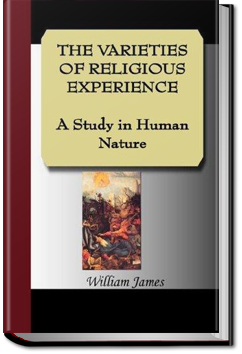

"When I say that we commonly make the object of our life that which we should not work for primarily, I mean many things which the world considers praiseworthy and excellent, such as success in business, fame as author or artist, physician or lawyer, or renown in philanthropic undertakings. Such things should be results, not objects. I would also include pleasures of many kinds which seem harmless and good at the time, and are pursued because many accept them—I mean conventionalities, sociabilities, and fashions in their various development, these being mostly approved by the masses, although they may be unreal, and even unhealthy superfluities."
Here is another case, more concrete, also that of a woman. I read you these cases without comment—they express so many varieties of the state of mind we are studying.
"I had been a sufferer from my childhood till my fortieth year. [Details of ill-health are given which I omit.] I had been in Vermont several months hoping for good from the change of air, but steadily growing weaker, when one day during the latter part of October, while resting in the afternoon, I suddenly heard as it were these words: 'You will be healed and do a work you never dreamed of.' These words were impressed upon my mind with such power I said at once that only God could have put them there. I believed them in spite of myself and of my suffering and weakness, which continued until Christmas, when I returned to Boston. Within two days a young friend offered to take me to a mental healer (this was January 7, 1881). The healer said: 'There is nothing but Mind; we are expressions of the One Mind; body is only a mortal belief; as a man thinketh so is he.' I could not a
Get ALL YOU CAN BOOKS absolutely FREE for 30 days. Download our FREE app and enjoy unlimited downloads of our entire library with no restrictions.
Have immediate access and unlimited downloads to over 200,000 books, courses, podcasts, and more with no restrictions.
Everything you download during your trial is yours to keep and enjoy for free, even if you cancel during the trial. Cancel Anytime. No risk. No obligations.
For just $24.99 per month, you can continue to have unlimited access to our entire library. To put that into perspective, most other services charge the same amount for just one book!

As avid readers, we understand the joy of immersing ourselves in a captivating story or getting lost in the pages of a good book. That's why we founded All You Can Books back in 2010, to create a platform where people can access an extensive library of quality content and discover new favorites.
Since our founding days, we’ve continuously added to our vast library and currently have over 200,000 titles, including ebooks, audiobooks, language learning courses, podcasts, bestseller summaries, travel books, and more! Our goal at All You Can Books is to ensure we have something for everyone.
Join our community of book lovers and explore the world of literature and beyond!
William James's classic "The Variety of Religious Experience" (1902) consists of the text of the twenty lectures he delivered as the Gifford Lecturer at the University of Edinburgh in 1901 -- 1902. James took has his theme the exploration of "religious feelings